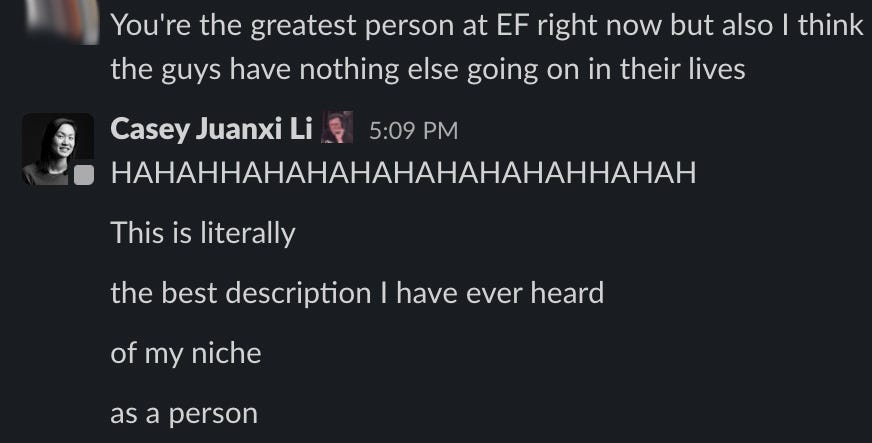Defensibility is authenticity
Your startup idea, you resume, and your PhD are not defensible. But your life story is.
Remember Chartreux the fat cat 🐈 from last week? We trick him into eating healthy food by mixing in a little bit of junk:
And in a similar vein, here is this week’s dumpster fire 🔥🗑️, to whet your appetite:
🗑️ Trash
As we approach week 7 of 8 at Entrepreneur First, it is a convenient time for many of us to start panicking getting creative about how we find co-founders, or drum up funding for our terrible brilliant business ideas.
It’s also a good time to stay trapped in marriages of convenience out of fear or laziness, or drag somebody across the ocean into a 🔫 shotgun wedding in Vegas 💒 … because at the end of week 8, anybody who is unpaired and not solo-founding… gets booted from the island. 👀🏝️
So, tensions are running high. 😬
foundering.tv 📺
In a classic example of a joke cracked 🐣 over breakfast 🍳 that turned into a serious idea 🥓, Sebastien Engelmann and I actually tried, in earnest, to crypto crowdfund a reality tv show about 16 people in an incubator, trying to form teams and create companies. 👀
(Source: https://mirror.xyz/dashboard/crowdfunds/0x983Ac86b7d6a2A0E1c570119383218694D90235B)
We’ve accumulated a whopping 0.15 ETH to date, though an individual in EF (who wishes to remain anonymous, probably because they don’t want anyone to know where their stipend is going) actually offered to invest $10,000.
I responded with the following line from Margin Call, mostly because we haven’t actually figured out what it takes to produce a TV show yet:
However, to address multiple demands by normies to invest fiat at lower minimums, we are introducing a shit-tier “NFT” that is really just the following .jpg, which will be emailed to you after your Kickstarter contribution:
Follow the Insta, if you haven’t already. If you fancy yourself a hot mess, you may even want to contribute some content 🔥
Sociopaths
Remember when I put a complete wallet seed phrase into my Slack name, to sniff out whether the global cohort contained any sociopaths?
The answer is yes. And not only that - they publicly confessed to it in the web3 channel too 🙃:
https://etherscan.io/address/0x3259bf2C56DdFEc04696225594C35b375968d976
Now that we have their Ethereum wallet address, we can mint their greatest psychological insecurity into an NFT and send it straight back. If anybody has tips, hit me up 👀 YOU KNOW WHO YOU ARE
Scams
In other news, after burning straight through our stipends on STEPN sneakers, some of us have turned to LinkedIn and WhatsApp scams:
Hall pass
If you find your very satisfying long term co-founder relationship of 2 long months growing a little bit stale, there are always ways to get creative:
Super Pumped
Lastly, just because you haven’t formed a team doesn’t mean you can’t become a CEO of an EF company:
That’s it for today’s garbage, folks. Bon appétit! 🍲
🍖 Meat
1) Let’s scrap the CEO / CTO dichotomy
I don’t use the CEO / CTO dichotomy because it projects the infinite dimensionality of human competence down to a very low-dimensional subspace. One way to defend the framework, however, is that complexity is mentally costly. Thus, it’s an 80-20 way to create complementarity in teams.
I challenge this. Let’s examine the list of top YC companies, and look at their founder composition. I’ll mark the ones that could be labeled a “classic” CEO / CTO pairing with a 🌭, and anything else with a 🍕:
🍕 Airbnb - two designers (Brian Chesky, Joe Gebbia), one engineer (Nathan Blecharczyk)
🍕 Stripe: Patrick Collison (MIT, computer science), John Collison (Harvard dropout, Physics)
🌭 Instacart: Brandon Leonardo (SJSU, engineer), Apoorva Mehta (Waterloo, Electrical Engineering), Max Mullen (USC, entrepreneurship)
🍕 Coinbase: Brian Armstrong (Rice, computer science)
🌭🍕 DoorDash: Andy Fang (Stanford CS), Stanley Tang (Stanford CS), Tony Xu (Stanford MBA; Berkeley, Industral Engineering)
As you can see, it’s basically noise at this point. (Credit for this exercise goes to Benjamin Parry!)
Also, none of us have a company at this point. There is no chief anything. So co-found with whoever you want to, as long as the basis vectors of your collective competencies span the subspace of skills that you need in order to solve your problem effectively*.
*And if you don’t know what that means…yikes 😬
(My 8th grade calculus teacher told me never to date anybody who doesn’t know the quadratic equation by heart, and this rule hasn’t failed to yield good returns yet. There’s nothing more appealing than someone who knows how to do math 😏)
2) Edge is authenticity. Being you is the only thing in the world that you have a true competitive advantage in.
EF defines edge as your unfair advantage, or right to win, in a certain industry, space, or problem. So let’s establish a few basic beliefs:
School (as in, traditional 4 year degrees or Masters/PhDs) doesn’t teach you anything, except maybe how to think. Your degree is not an edge.
It’s possible to work in an industry for many years and simply pick up the convictions of the status quo, instead of thinking critically about how things are structured, and thus how they can be changed. Your work experience is not necessarily an edge either, and can actually blind you to possibility if you are a highly mimetic person.
On top of this, EF generally recruits a demographic between 25-35 years of age. Such people are less likely to have priorities that compete with a company, such as family, mortgage, etc. The tradeoff, of course, is that the earlier and more unfettered you are in life, the less likely you are to have any real wisdom or insights about how the world can be made better. You haven’t lived for that long or seen many things, and you’re busy trying to grapple with your own shit.
So the very people who have the freedom to start companies are usually the same people who don’t know enough about anything to do so effectively. 🙃
Assuming you buy into the above (and I want to hear from you if you don’t), what are you then left with?
Well, the only true thing that you have 20-30 years of experience doing day in and day out, and that nobody can beat you at, is being yourself.
And I don’t mean that in some kind of hokey “love yourself” bullshit kind of way. Though ngl, I do really like this Audioslave song:
I mean that when you give yourself the freedom to define “edge” outside the constraints of being a “CEO”, “CTO”, “PhD”, “engineer”, “salesperson”, etc, you can then recognize the infinite dimensionality of ways in which humans can be excellent at problem solving:
You could be profoundly good at listening with genuine emotional presence, and responding with thoughtful questions, which is all a good customer interview comes down to. Actually, this is all that any good conversation is.
You could be extremely skilled at recognizing and managing trauma and insecurities in others, and understanding how to get a co-founder to stop being their own worst enemy.
You could be a genuine contrarian and risk taker. It’s cool to call yourself a contrarian nowadays; it’s extremely painful to actually be one. Millions of years of evolution have conditioned you to be extremely sensitive to the approval of the herd around you. Sure, running against the crowd may net you a billion dollar exit nowadays, and these are the stories we hear about through movies like The Social Network, or TV shows like Super Pumped. It’s much more likely to just get you branded as a narcissistic asshole. A few thousand years ago, you’d be the one dumb antelope on the savannah that got eaten for straying from the herd. Those evolutionary pathways run deep in your brain, and they are genuinely hard to buck.
But let’s say you’re not swayed by soft, human things. If what drives you is the cold, hard cash and fame of commercial success, then realize this: once you overlap the set of things that you and your cofounder are genuinely capable of (“why you”), with what the market will support at any given moment (“why now”), you are left with a tiny, tiny intersection.
Your job is not to come up with a brilliant, “defensible” business idea. (More on why that mental model is flawed later). Nor is it to worry about what your advisors might think, what the VCs want to hear, or how to “win” IC.
Your job is to operate in that tiny intersection, because the game of founding a company is already so hard that cannot afford to waste energy trying to be something you’re not:
3) Hard is the only thing that is defensible
EF tells us that you’ve stumbled on an interesting idea when half the room violently disagrees with it, and I’ll be doing just that.
One of the assigned EF readings is Hard is not Defensible, by Venture Partner Alex Crompton. In summary, Alex argues that a problem being “hard” is not sufficient reason to call it defensible: something can be hard to do the first time but then easily copied, or inherently hard to do but then winnable via brute force (i.e. armies of consultants).
I disagree with both these premises:
Specific outcomes may be easy to copy, but the process that generates an insight is not.
Anything that can be done via dumb brute force (i.e. consultants) was probably not that meaningful in the first place.
But I’m here to argue something even stronger: doing hard, schleppy things is the only way to build something defensible. Ideas are a dime a dozen. It’s not the idea of being a good search engine that made Google defensible: it’s the fact that they actually managed to create a good search algorithm, which is a hard, schleppy thing to do, and for which there are no shortcuts. Otherwise, Bing would be just as “defensible” as Google.
There is no such thing as a defensible business idea.
Hard work to gain insight and produce outcomes can create something defensible, and that can only be proven with time and effort.
Lastly, I want to thank this person - you know who you are - for this brutally honest gem:
Till next time, folks.
xoxo,
Casey 💖












very good insights!
I generally like the EF framework, because it weeds out crap. There are a lot of misconceptions in the normie world:
- ideas are valuable (stealth mode bs etc)
- solutions-first thinking
- building sth to solve a problem you've had personally without seeing the larger picture
- building stuff so it scales
you can weed out 90% of this out (and you'll have some false positives) with the following:
- non obvious belief
- mom testing
- market sizing
- edge fit, advantage over competition (hugely variable on idea you're testing)
love this. there was never a correct way to live a life